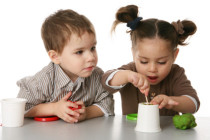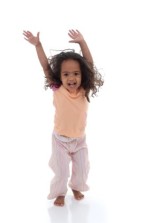
Early Preschool Program (Age 3 to 4)
Our Early Pre-K Program is offered for children ages 3 through 4 years of age. Each week a letter of the alphabet is selected and built into the curriculum. The letter of the week is integrated within all areas of learning including reading and writing, math, science, art, health and nutrition, and physical activities.
Early Preschool Curriculum Goals
Language and Literacy
- Develop the ability to sit still, look at speaker, respond and wait for own conversation turn.
- Learn to follow simple directions.
- Learn to respond to language that is read to them with related comments or questions.
- Develop the ability to converse with adults and other children.
- Use language to describe events, make decisions and participate in classroom discussions.
- Use language to express need/wants (as opposed to gestures/noises).
- Continue to develop vocabulary and grammatical construction of own speech.
- Write scribble messages.
- Use pictures to convey ideas.
- Trace letters and name.
- Recognize letters of the alphabet.
- Know letters of the alphabet’s corresponding sounds.
- Develop awareness that letters represent words.
- Develop an interest in reading.
- Recognize print within own environment.
Math/Science
- Develop abilities to identify commonalties and differences among objects.
- Develop abilities to describe, match, and sort objects by their attributes.
- Develop the ability to rote count to 15.
- Begin to develop one to one correspondence when counting objects.
- Begin to recognize numerals 1-10.
- Explore the concept of more or less.
- Take part in activities designed to recognize, name, and describe shapes.
- Learn to be responsible for their personal health.
- Develop understanding of safety habits for school, home, and weather emergencies.
- Basic weather.
- Learn signs of the seasons and how they relate to weather.
- Learn about senses.
- Learn the names of and be able to identify colors.
Visual Art
- Explore the basic elements of art.
- Learn to use art materials in creative ways.
- Gain pleasure from a variety of art related sensory experiences.
- Begin to express ideas and feelings through art.
- To respect their own, as well as others' art work.
Dramatic Play
- Use their body to represent objects.
- Experiment with a variety of objects, roles and characterizations.
- Dramatize familiar stories, songs, poems, and past events.
- Develop the skills to create a play theme.
- Combine constructive and pretend play.
- Develop verbal skills in the context of dramatic play.
Social-Emotional Development
- Become aware of socially appropriate behaviors.
- Develop the ability to accept reasonable limits set by adults.
- Begin to practice cooperative behavior.
- Begin to develop empathy for other peers and adults.
- Become aware of own emotions and learn to express them constructively.
- To separate from parents with ease.
- Show age-appropriate independence in caring for themselves.
Physical Development
- Use their whole body to strengthen muscle groups, (running, jumping, hopping, climbing, throwing, catching, and kicking).
- Participate in a variety of motor activities designed to enhance physical coordination, endurance, flexibility and agility.
- Develop awareness of body position in space.
- Begin to develop eye-hand coordination, finger, thumb, and whole hand coordination, strength, and endurance.
- Begin to practice using writing tools and scissors correctly.




